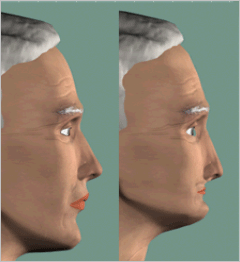Who is a candidate?
- Any person in good health with adequate bone mass in the jaw.
- If you have 1 or more missing tooth.
How successful are implants?
Clinical studies show that implants have a success rate of more than 95%. Good oral hygiene helps ensure implant success.
Will I feel pain?
Anesthesia and sedatives will eliminate virtually all discomfort during the procedure. Prescribed medications can alleviate pain following the surgery. Most patients say the discomfort is less than that of having a tooth pulled.
How long does it take?
The entire process requires 2-9 months (sometimes longer). The length of time depends on how quickly your jawbone grows around the artificial roots. Most patients choose to wear a temporary crown while their bone is growing.
When is the ideal time to have implants?
Ideally, immediately after tooth is lost. This helps prevent degeneration of bone and tissues. Other candidates are patients who wish to replace a bridge or dentures.
Advantages of Implants:
Bone Preservation
Once a tooth is lost, the surrounding bone gradually dissolves. Implant supported teeth are anchored securely to your jawbone and will preserve the remaining bone while maintaining the integrity of your facial structure.
In dentures, shrinkage of the jawbone alters the fit of dentures, resulting in slippage, exposed nerves and gum irritation

Indicates profile of facial structure with bone loss
Improve your speech
Ill-fitting dentures can cause facial muscles to become tense as the muscles attempt to hold the teeth in place causing mumbling, slurred speech and clicking.
Eat better
Implants can achieve chewing efficiency comparable to natural teeth, letting you enjoy your meals.
Eliminate inconveniences and embarrassment
With implants, there is no need for gooey adhesives and you will never have to worry about your teeth popping out when you laugh or talk.
|
